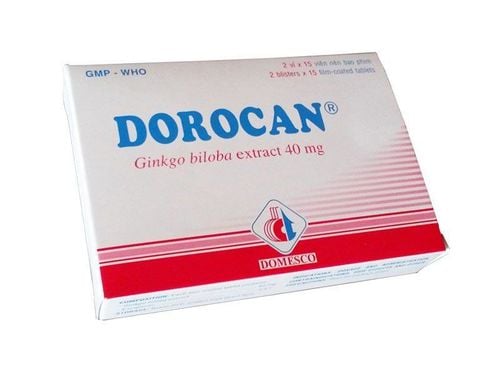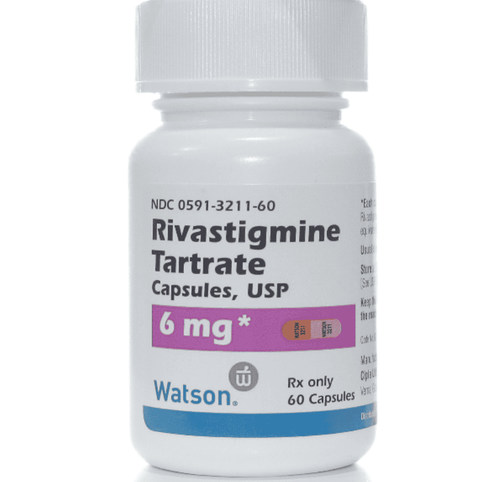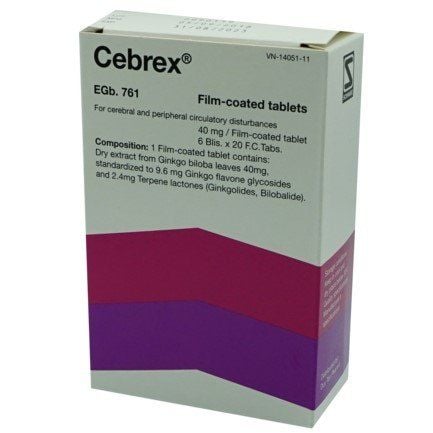This is an automatically translated article.
Donepezil is indicated for symptomatic treatment and temporary relief of mild or moderate dementia in Alzheimer's disease. The following article provides some information to keep in mind when using Donepezil.1. Some general information about Donepezil
Donepezil hydrochloride is prepared in the form of drugs with the same strength as:
Film-coated tablets: Drugs Donepezil 5mg, 10mg, 23mg; Lozenges: Donepezil 5mg, 10mg.
2. Indications and contraindications to the use of the drug Donepezil
2.1. Indications Donepezil is indicated for the symptomatic treatment and temporary relief of mild, moderate and severe dementia in Alzheimer's disease. ).
2.2. Contraindications Donepezil is contraindicated in the following cases:
Do not use Donepezil in cases of hypersensitivity to donepezil, piperidin derivatives or hypersensitivity to any component of the medicinal product. this economy. The drug is not indicated for use in children under 18 years of age.
3. Dosage and instructions for taking Donepezil
3.1. How to use Donepezil Donepezil taken orally, patients can take the drug before or after meals, because food does not affect the rate or extent of the absorption of donepezil. For Donepezil 5 or Donepezil 10 mg tablets, the tablet should be swallowed whole with water without breaking or breaking the tablet. For Donepezil 23mg tablets, when taken, the tablet should be swallowed whole with water without breaking or chewing because it will cause a change in the rate of absorption. For lozenges, when using, place the lozenge on the tongue so that the tablet dissolves with saliva in the oral cavity and then swallows, no need to drink with water. 3.2. Dosage for each user group Adults and the elderly: The first days of treatment will start at 5mg/dose/day. This dose of 5 mg/day/dose should be maintained for at least 1 month, the aim being to assess clinical response as soon as possible, as well as to help achieve steady-state donepezil concentrations. After 1 month of using 5mg/dose/day and clinically evaluated, the user can increase the dose up to 10mg/dose/day. This is also the maximum allowed daily dose. Doses greater than 10 mg/dose/day have not been studied in clinical trials. When patients stop using the drug can feel a gradual decrease in the beneficial effects of donepezil. However, to date, there is no evidence of a rebound effect after abrupt discontinuation of therapy. Children: Donepezil is not indicated for use in children. Other user groups: For patients with mild or moderate renal or hepatic impairment, a similar regimen can be used, as the condition does not affect the clearance of donepezil.
4. Side effects when using Donepezil
During the use of Donepezil medicine, patients may experience some side effects caused by the drug such as:
Commonly reported side effects occur:
Insomnia, headache, feeling sore, tired fatigue, dizziness, dream disorder, excitability, hallucinations, depression, confusion, emotionality, personality disorder, fever, drowsiness, excessive sleep, becoming aggressive , feeling anxious, having difficulty speaking, paranoia, restlessness, excitability, dizziness. Raise or lower blood pressure, feel chest pain, bleeding, syncope, atrial fibrillation, ECG abnormal results, edema, heart failure, peripheral edema, vasodilation. Respiratory diseases such as bronchitis, increased cough, shortness of breath, pharyngitis, pneumonia. Gastrointestinal diseases such as nausea, vomiting, diarrhea, loss of appetite, weight loss, abdominal pain, constipation, dyspepsia, epigastric pain, involuntary defecation, gastroenteritis, pain tooth. Dermatological diseases such as the appearance of bruises, eczema, itching, rash, skin ulcers, urticaria. Body dehydration, hyperlipidemia, decreased sex drive. Diseases of the urinary tract: frequent urination, bedwetting, cystitis, blood in urine, nocturia, glucoseuria. Contusion, anemia. Increased alkaline phosphatase. Muscle spasticity, back pain, increased creatinine phosphokinase, arthritis, loss of coordination, easy fracture, altered gait, increased lactate dehydrogenase, paresthesia, feeling shaky and shaky, weakness. Visual pathologies such as blurred vision, cataracts, eye irritation. Users suffering from bacterial infections, fungal infections, sweating, flu symptoms. Rare side effects:
Active ingredient donepezil warns that the drug can cause seizures, bradycardia, gastrointestinal bleeding, peptic ulcer. Rare side effects:
Extrapyramidal symptoms. Cardiovascular disease such as angina pectoris, sinus-atrial block, atrioventricular conduction block. Severe digestive diseases: gastrointestinal ulcers, gastrointestinal bleeding. Liver function is disturbed.
5. Notes when using the drug Donepezil
These are the warnings and cautions for the use of Donepezil
General warnings and precautions:
Treatment should be supervised by a physician with experience from the beginning of the treatment. intellectual impairment. Diagnosis should be based on internationally recognized guidelines such as DSM IV - Diagnostic and Statistical Manual of Mental Disorder, ICD 10 - International Classification of Diseases.
Treatment with donepezil should be started when the patient has a caregiver at all times, to help the patient take the medication on a regular basis. Maintenance therapy can be continued as long as the drug is still effective for the patient. Therefore, the clinical efficacy of donepezil should be periodically reviewed and evaluated, and treatment discontinuation considered when efficacy is no longer available. Individual responses to donepezil are variable and unpredictable. The use of donepezil in patients with severe dementia, with other types of dementia or with other types of memory impairment such as age-related cognitive decline, has not been studied.
Warnings and Precautions in Anesthesia: Donepezil is a cholinesterase enzyme inhibitor capable of enhancing succinylcholine-type muscle relaxation during anesthesia. Cardiovascular warnings and precautions: Due to the pharmacological effects of this drug, cholinesterase inhibitors may have parasympathetic effects on heart rate, most commonly bradycardia. The possibility of this effect should be of particular concern to patients with “pathological sinus rhythm syndrome” or to patients with conditions of supraventricular conduction of the heart such as sinoatrial or atrioventricular conduction blockade.
Gastrointestinal warnings and precautions: Patients at high risk of peptic ulcer disease, eg patients with a history of ulceration or patients taking concomitant nonsteroidal anti-inflammatory drugs (NSAIDs) ; NSAID) should be closely monitored for gastrointestinal symptoms. However, clinical studies with donepezil showed no increased incidence of peptic ulcer or gastrointestinal bleeding compared with placebo.
Urogenital warnings and precautions: Although not documented in clinical trials of donepezil, drugs with choline-like effects may cause urinary retention.
Neuropathy Warnings and Precautions:
Epilepsy: Drugs with choline-like effects are thought to have the potential to cause generalized convulsions. However, when seizures do occur, they can also be a manifestation of Alzheimer's disease. Drugs with choline-like effects may aggravate or cause extrapyramidal symptoms. Neuroleptic Malignant Syndrome (NMS): A potentially fatal syndrome characterized by symptoms such as hyperthermia, muscle stiffness, altered cognition, elevated plasma creatine phosphokinase, It has been reported (but very rarely) with donepezil use, mainly in patients discontinuing antipsychotics. Other signs were also noted including rhabdomyolysis, acute renal failure. If the patient develops signs and symptoms of NMS or an unexplained high fever, the drug should be discontinued. Respiratory: Because of the drug's choline-like effects, care should be taken when prescribing cholinesterase inhibitors to patients with a history of asthma or obstructive pulmonary disease. Donepezil should not be used in combination with other acetylcholinesterase inhibitors, cholinergic agonists or antagonists.
Severe hepatic impairment: No data are available in patients with severe hepatic impairment.
Excipients: The mannitol component in the preparation may cause a mild laxative. The ingredient aspartame in the preparation is a source of phenylalanine, so it should be used with caution in people with phenylketonuria. Donepezil is indicated for symptomatic treatment and temporary relief of mild or moderate dementia in Alzheimer's disease. To ensure the effectiveness of treatment and avoid side effects, users need to strictly follow the instructions of the doctor, professional pharmacist. Follow the website of Vinmec International General Hospital to get more health, nutrition and beauty information to protect the health of yourself and your loved ones in your family.
Please dial HOTLINE for more information or register for an appointment HERE. Download MyVinmec app to make appointments faster and to manage your bookings easily.













